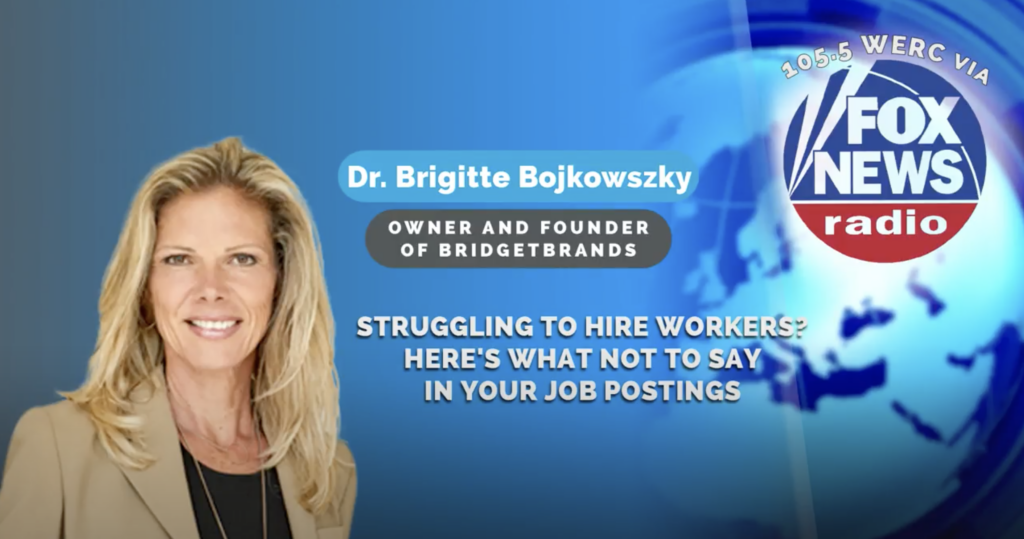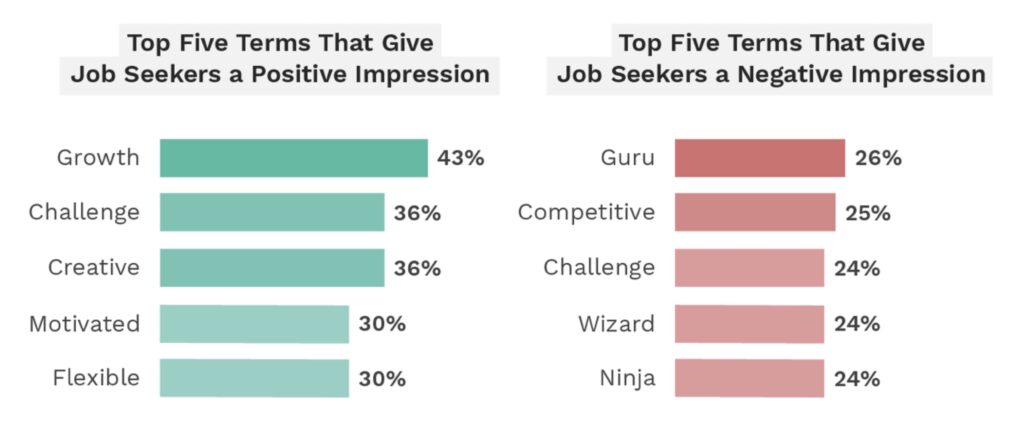Have you been struggling to hire employees? This might have something to do with your job posting. Words matter and they matter a lot.
I was recently invited on FOX NEWS RADIO to offer my perspective on this topic as a global branding and marketing strategist.

The ultimate goal of a job post is to attract a pool of talented applicants who are the right fit for the hiring company. Thereby it is to consider that words are not just words. They convey meaning. Different generations associate different meanings to words, to terms, we use in our everyday life but also in job posts.
That implies that a company needs to be very specific and clear about the wording. It is a question of whom you want to attract, whom do you want to appeal to with your job posting. Is it the younger generations, such as the GenZs, born 2000 or later, or the Millennials aka Generation Y, born 1980 – 1999? Or is it the older generations, the Generation X, born between 1965 and 1979, or even the Baby Boomers, born between 1945 – 1964?
Recently a survey about the most liked and most unliked words in job posts was conducted by Skynova.

According to that survey, the term growth is most liked with 43% of the respondents. Generally, growth is associated with personal development, with inspiration, with all opportunities to where the sky is the limit.
The word challenge ranks high in both categories. It is ranked second of the most liked with 36% and the third least liked with 24% of the top five terms ranking. Challenge is a word Generation X prefers over the synonym word ‘problem’. Many of this generation were told to use the word challenge instead of the word problem because challenge invites you to take action versus problem is per sé negatively associated as it makes someone refrain from taking action.
Younger generations such as GenZs and Millennials like to collaborate, they value community and love to co-create. According to a study from NC State University they “work to live, not live to work”. They seek for a higher purpose, more than just bottom-line making profit. They are more tuned into social and environmental causes than previous generations. If you want to attract these generations you would want to stay away from these two terms, competitive (ranked second of the unliked top 5 list) and challenge.
Guru, the most unliked word with 26% in the survey, does not qualify at all in a job post if you want to appeal to younger generations. Gurus are ambitious and competitive go-getters who like challenges and never make a mistake. They are the opposite of co-creators and collaborators of what GenZs are by nature.
Unliked is also the term Wizard. Younger generations like the real thing, they want to work with companies that “keep it real”. They value authenticity, transparency, and honesty. A wizard does not embody that.
Lastly, Ninja ranks fifth on the least liked list. Ninja, a Japanese term, which stands for espionage and assassinations. As GenZs and Millennials value peace, inclusion, diversity, and equality, this term should not be used at all means!
Whereas on the most liked words list are on third to fifth place, creative, motivated, and flexible, in that particular order. These words convey freedom and happiness and exactly speak to GenZs. They are creative, bold and the creators of many trends. They show up more casual and bring their full authentic selves to the workplace.
Companies must go with the Zeitgeist. They must evolve over time and adapt their communications strategies, their messages, their job posts, to current trends. Through their job posts, they communicate their corporate brand identity with their underlying value system, which creates a specific perception in the market. In that way, these company brands create their brand image among their audience. In order to get the right people on board, your brand identity needs to 100% align with the brand image that possible applicants have of you. Wants and values differ from generation to generation. Especially, the GenZs seek alignment between their values and those of their employer. You need to have an understanding of your potential employees’ value system and, consequently, you need to speak their language. It is an employees/job seeker’s market, they are in the driver’s seat. The bargaining power is with the employee.
This is a vital issue when it comes to offering remote workplaces or a hybrid form of working arrangements. According to Ladders, 25% of high-paying jobs ($80,000/year) will be remote by the end of 2022.
From a vantage point on a global scale, the factor of culture adds on another facet that needs to be considered. Different cultures have different value systems. Additional layers that marketers, HR departments, and diverse stakeholders of companies, have to factor in their strategies to make a workplace attractive nowadays.
Companies hire the best candidates from different parts of the world. That being said the market remains competitive to a certain extent as candidates from outside the US might as well ask for a lower pay-check than comparable candidates in the US.
🔸🔸🔸
- To know more about how I can help make your brand shine and bring the brilliance out of you, book a 30 min intro call or drop me an Email.
If you are a Brand Lover tune in to my BrandsTalk podcast and learn from brand stories told by my distinguished guests. Listen on
- my BrandsTalk website
- your favorite platform/app, such as Apple podcasts, Spotify, Amazon Music, Google Podcasts
